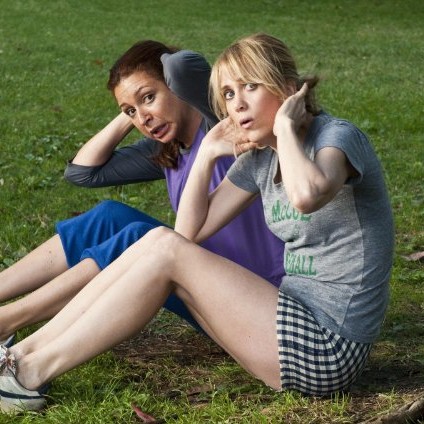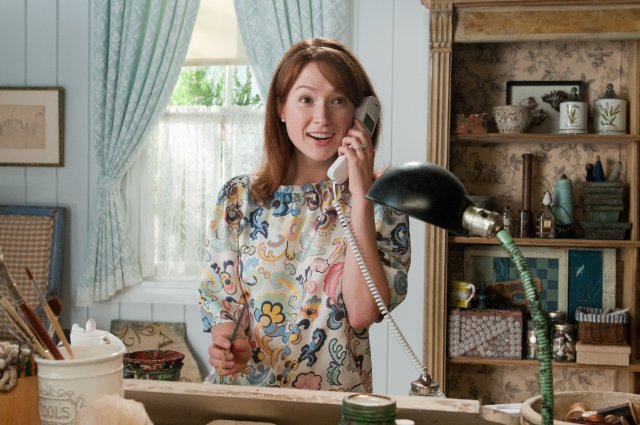Bridesmaids
Midway through “Bridesmaids,” the bridal party dines on hordes of meat at a Brazilian churascaria, shortly before shopping for gowns. There’s enough tension to cut granite between Annie (Kristen Wiig), the still-single maid of honor and the bride’s lifelong friend, who favors humble, quaint wedding party arrangements, and Helen (Rose Byrne), a decor-obsessed trophy wife with money to burn. In the midst of arguing about bachelorette party concepts, Annie offers Helen some meat. “No thanks, I don’t want to bloat before a fitting,” Helen responds, in pitch-perfect superiority-posing-as-modesty fashion.
In a Judd Apatow production, no mention of gastrointestinal or bodily fluid concerns is overlooked . So naturally, the meat-eaters pay their price. Just after they’ve slipped into $800 dresses at a high-end boutique shop, their stomachs start rumbling, their faces redden, the sweat breaks out. Soon, two of the women are hurtling to the shop’s single bathroom, vomiting on their gowns—and each other— into a single toilet. Meanwhile, the fat, bawdy Megan (Melissa McCarthy) defecates into a sink; Wiig swallows her puke along with a breathmint; and, in the most disturbing fecal-related cinematic shot since Divine actually consumed dog shit in “Pink Flamingos,” the gown-clad bride herself (Maya Rudolph), dashing to find an unoccupied restroom, has a full-blown “accident” in the middle of a busy intersection.
I found this whole sequence to be thoroughly depressing, and not only because it will inevitably sink the popularity of my favorite cuisine. Unlike, say, Cameron Diaz gleefully spreading spunk on her hair in “There’s Something About Mary,” the actresses don’t convey much joy or bravado at this sort of debasement. Still, the mostly female, college-age audience I saw “Bridesmaids” with howled through their disgust. Certain critics expressing their distaste have been met with indignant responses, of the “Guess what? Ladies shit, too!” variety. Maybe they do, but in the words of my girlfriend: “Does there have to be equal rights for grossness in movies?”
In Hollywood, the answer is evidently yes. Apatow has long been criticized for creating such bland, unfunny female characters in male-dominated raunchfests like “The 40 Year-Old Virgin.” So he and director Paul Feig (of “Freaks and Geeks” fame) gave mostly free license to Wiig and co-screenwriter Annie Mumolo to present a female point-of-view on casual sex, on friends drifting apart, on arrested adulthood. I say “mostly” because, ironically, the dress-fitting fiasco scene—widely raved about as finally usurping the debauchery throne from men— was injected by Apatow and Feig, after they feared “Bridesmaids” was getting “too girly.” According to them, it’s men that want to see women puking and shitting their way to comic glory—though most men I know like to pretend girls are golden, mythical creatures, unhindered by such baseness, however “natural” it might be.
Up until this scene, “Bridesmaids” had been a refreshing chapter in female-dominated comedy. It’s both more biting and more humane than so-called “chick flicks,” in which competitive, materialistic harpies claw their way to the altar. And it actually exists, to some extent, in reality, unlike cynically vulgar female bonding films like “The Sweetest Thing,” the long-forgotten Cameron Diaz/Christina Applegate romp that framed the skimpiest of plots around fellatio and men’s room urinal-related gags.
That’s why it’s such a shame that Feig and Apatow insist on coarsening the material. The film was already a hilarious story about female angst, already giving the bulk of the laughs to women instead of men, already too intelligent to be called a mere “answer” to “The Hangover.” And Wiig, easily “Saturday Night Live’s” brightest, most eccentric female performer since Victoria Jackson, deserves a film as good as her performance. Wiig certainly infuses “Bridesmaids” with her brand of inconsequential humor—in two separate scenes, Wiig simply goofs off for five minutes straight, wonderfully unhinged, in the face of stern authority figures. But she is also not afraid to show Annie’s selfish, jealous side. We share in her scorn for the solipsistic Helen, but we also know when she’s gone too far into self-pitying rage.
The film itself, however, like even the best of Apatow’s projects, is maddeningly overwritten. The tone shifts capriciously from gross-out farce to heartfelt romance to Wiig acting wiggy. McLevon-Covey and Kemper virtually disappear after the first half; their sole purpose is to embody one or two bridesmaid stereotypes, which makes them conceits more than characters. And worst of all, someone decided, midway through, to turn McCarthy’s portly, impulsive Megan into a sex freak. It’s funny enough that Megan, a slovenly dresser, is supposed to be a wealthy government employee with “six homes,” that in her first conversation with Wiig, she divulges every detail about her leg injury, that she head-butts people as a sign of affection. McCarthy is a huge force of comic energy as it is; there’s no need for her character to be a repulsive predator that corners far skinnier men in airplane corridors, gasping about “the heat up her leg.”
Perhaps the gender imbalance issue should stop being applied to scatological humor. It may be time for Apatow and crew to accept that their audience, male and female, is starting to grow up.
news via inbox
Nulla turp dis cursus. Integer liberos euismod pretium faucibua







The review, well-written as it is, is enough to gross me out so I’ll definitely pass on the film although ever since “Damages” I’ve been looking forward to more Rosie Byrne. I also wonder if such light fare deserves to be written up at such length.